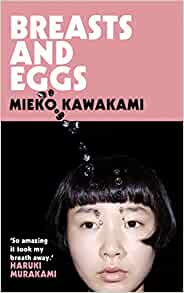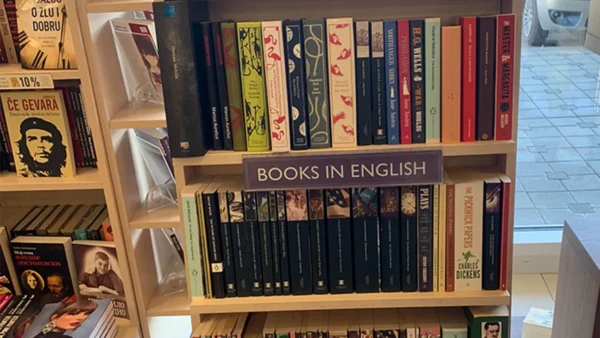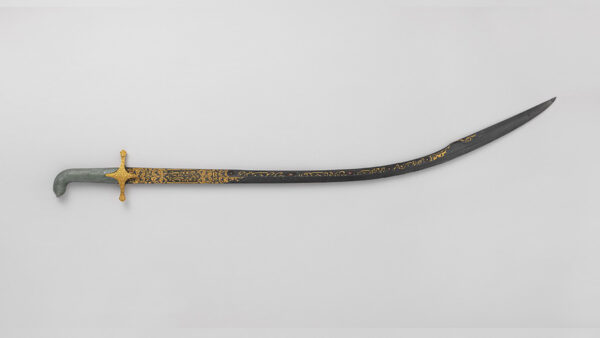What does it mean to be a woman? In the memorable novel Breasts and Eggs, Mieko Kawakami explores the question by looking at two key periods in the life of Tokyo writer Natsuko Natsume.
What does it mean to be a woman? In the memorable novel Breasts and Eggs, Mieko Kawakami explores the question by looking at two key periods in the life of Tokyo writer Natsuko Natsume.
The focus on the nature of contemporary womanhood is sharpened by the eye-catching title of the English translation, Breasts and Eggs. The original Japanese title was Natsumonogatari, which Google Translate renders as the somewhat bland “Summer Story”. (I’m not a Japanese speaker, so I’d love to hear a confirmation or correction on that from someone who is.)
So the translators, Sam Bett and David Boyd, made quite a radical change in the title. I think it’s largely because the Japanese title is also a play on the main character’s name, and that wouldn’t work in English unless you also translate her name to “Summer” throughout the book, which would be weird.
But Breasts and Eggs also just works better as a title, and not just because it’s more attention-grabbing than Summer Story. It works because breasts and eggs are recurrent themes in the book.
The first part of the book focuses heavily on Natsuko’s sister Makiko and her plans to have her breasts surgically enhanced. The second, which occurs a decade or so later, is more about eggs: Natsuko’s dwindling supply, and her growing desire to have a baby using donated sperm.
But the themes show up in other ways too. In the first part, there’s a memorable scene in which Makiko’s daughter Midoriko starts speaking to her for the first time in months and punctuates her words by taking eggs from a carton and cracking them over her head. Makiko then starts cracking eggs on her own head too:
“They took turns, working their way through the carton. Their heads glistened from the eggs. Shells crackled underfoot. The floor puddled with yolk and blobby egg white.”
Kawakami takes an unusual look at motherhood in this novel. Upending the common description of childbirth as bestowing the “gift of life”, she more often depicts it as a burden dumped on an innocent, unsuspecting victim.
The young Midoriko in the first part, for example, is furious at her mother for giving birth to her and all the problems it led to for both of them:
“Think about how great everything would be if none of us were ever born. No happiness, no sadness. Nothing could ever happen to us then. It’s not our fault that we have eggs and sperm, but we can definitely try harder to keep them from meeting.”
Later in the book, as Natsuko researches the possibility of sperm donation, she meets a group of people who were conceived using donated sperm and felt betrayed when they found out that they had no way of finding their biological fathers.
One of them, Yuriko, describes parenthood as a selfish gamble—while every parent thinks their child will be healthy and happy, many are born into horrific pain. And they make the gamble because it’s safe—it’s the child who will suffer, not them:
“The really horrible part is that this bet isn’t yours to make. You’re betting on another person’s life. Not yours.”
Yuriko evokes the image of coming upon ten sleeping children in a house in the forest. If you wake them up, nine will be happy and grateful, but one will suffer nothing but pain. Do you wake them up or leave them blissfully asleep?
I don’t think the analogy is entirely fair. For one thing, the chances of giving birth to a baby whose life will be full of nothing but pain are a lot smaller than one in ten. For another, most parents also suffer when their child suffers, and they do their best to spare their child as much pain as they can. But looking at childbirth from the perspective of the unborn child is certainly interesting and thought-provoking.
Breasts and Eggs also explores the nature of womanhood through sex. Natsuko is unable to have sex—she found it so painful and unpleasant that she hasn’t had sex for years and experiences no desire to do so—and this leads her to ask herself: “Am I really a woman?” It also leads her to give up on the idea of a relationship and decide that she must live alone and have her baby on her own, even though she has met a man who loves her and, it seemed to me, could have accepted her aversion to sex.
But extreme reactions and judgments are part of the book. Natsuko’s decision to have a child using donated sperm doesn’t seem to be that controversial to me, but other characters like her sister and her publisher react in horror or describe it as ridiculous. The same goes for Makiko’s breast enhancement surgery in the first part—she gets more condemnation than seems warranted.
Perhaps some of it is due to cultural differences—Natsuko notes several times in the novel that the West is more accepting of sperm donation than Japan. But I think some of it is also due to a choice by the author to highlight the ways in which women and their bodies are judged and evaluated, with any deviations from the accepted norm treated harshly. That, sadly, is still very recognisable in any culture.
I read Breasts and Eggs for Japanese Literature Challenge 14. You can find more reviews of Breasts and Eggs and other works of Japanese literature over there. Or read more of my Japanese literature reviews here. And feel free to join in with the challenge yourself if you have time—it runs until March!





There are 9 comments
Andrew, I am always so fascinated by your beautifully written posts. You take the snarl of my thoughts, and untangle them into a beautiful, linear line, getting to the essence of the novel so succinctly.
I was not prepared for the heavy themes in this novel: motherhood, conception, sex, beauty…but, there is probably not a woman who would not have a reaction to something Kawakami has to say. And, even a man! It was interesting how she brought Jun Aiswara in, who pointed out one of my favorite parts: if only Jun could have told the man who served as his father that Jun felt he was his “real” father. Sometimes, the person who stands in that role is far more of a parent than the actual birth parent.
Another interesting thing to me was that we are never told if Makiko has her breasts augmented or not…
Finally, I was strike by the way children of donor conception are similar to those who are adopted. They both seem to have a certain longing, and a certain pain, and not knowing who the birth father is.
It was such a big book, in its many themes, disguised within relatively few pages. I wish we could all have a face to face chat to discuss it together, but I thank you for sharing your thoughts here.
Wow, thanks so much, Meredith! That’s a really kind thing to say. It feels as if you then take the snarl of my posts and untangle them with your comments, so if we keep this up, maybe we’ll really get to the root of things in the end!
You raise some excellent points—I think Jun was a very important character in the book. That was a fascinating balance, wasn’t it? The way that it caused him pain not knowing who his birth father was, but the way he still thought of the man who raised him as his “real” father and wished he could have told him that. Makes me think that Natsuko was onto something with her idea that if parents were just honest and open, maybe it doesn’t matter. It’s the secrets, and the potential of finding out in a bad way and feeling deceived, that cause the biggest problems.
The same issue, which you so succinctly stated at the end of your comment, applies to adopted children as well. The more I think of this novel, the more I realize Kawakami has addressed issues beyond breasts, and even perhaps, eggs.
Yes! Reminds me of that old Mike Leigh film Secrets and Lies. Those are what can really corrode a family more than the fact of adoption or donor conception. That said, I can also understand why it could be a difficult conversation for a parent to have, and difficult to know at what age to have the conversation, and easy for the conversation to get postponed or end up not happening until it’s too late and the child has already found out in a bad way. Although I don’t have any experience with parenting, I have plenty of experience with procrastination.
argh! It should read, in the second to last paragraph, “at” not knowing who the birth father is…
I too was struck by the fact that we never hear if Makiko had her breasts augmented after all… I love reading reviews of this book by men, because Kawakami did mention that quite a few men in Japan loved this book and wanted to talk to her about it too, which she was really surprised by. (Again, I think that is more indicative of Japanese society).
The original title is not all that bland: Natsu Monogatari plays on the fact that the main character is called Natsuko, as well as summer – and hearkens back to traditional Japanese literature, both because of the use of Monogatari for ‘Tales of’ and also because Natsu becomes a kakekotoba, i.e. a ‘suitcase’ word, which packs several meanings at once.
Ah, thanks very much for the explanation of the title. So many resonances in the Japanese version, which would not have existed in a literal English translation. I can see why they changed it.
It’s a shame that Kawakami was surprised men were interested in her book, but I can understand it. When men write books about men, they’re supposed to be for everyone, but when women write about women, it becomes some kind of niche that only other women would be interested in. I think we’re moving beyond that, but too slowly.
I know they’re not the same writer, but because I’ve never read either author, whenever I see either this book referenced, I get confused with Mo Yan’s Big Breasts and Wide Hips (also available in English translation). I enjoyed reading the explanation of the translation for the title in the comment above. Last year, I read Convenience Store Women, but I don’t think I’ve read another Japanese novel since. One of my MustReadEverything authors is Banana Yoshimoto and I know I have one single title left to read (a relatively recent English translation). Maybe now would be a good time!
Ah, thanks for the reminder! Banana Yoshimoto has been one of my MustReadSomething writers for about a decade now, but I’ve never got around to it. Any recommendations?